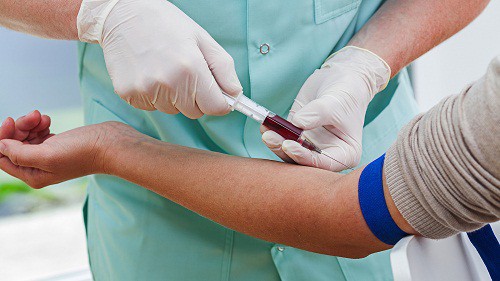
The Hanoi Medical University is applying a new low-cost cancer therapy in curing the five most common cancers in Vietnam. The initial results have been satisfactory.
 |
The Hanoi Medical University is applying a new low-cost cancer therapy in curing the five most common cancers in Vietnam. The initial results have been satisfactory.
Prof. Dr. Ta Thanh Van, rector of the Hanoi Medical University, director of the Center for Gene-Protein Research, and head of the cellular immunotherapy team in Vietnam, said that the therapy had brought encouraging results after one year of pilot application.
One of the persons undergoing the therapy is a 70-year-old patient in Hanoi, suffering from terminal mesenteric cancer and receiving palliative care. All hope of treating the disease was almost gone. In such conditions, the patient was brought to undergo therapy at Hanoi Medical University.
After three courses of treatment, the patient now can stand up and move around. He can take a bus to hospital to receive treatment and play with his grandchild for up to five hours.
N.V.N, 50, a patient in Hanoi, suffering from terminal bone cancer, has also been undergoing the new therapy. The patient was in such pain that intravenous morphine could not help.
After receiving cellular immunotherapy, the pain was relieved and he now can sleep.
According to Van, terminal cancer patients have responded very well to the therapy, others have responded moderately, and the majority of patients have seen their life quality improved.
Ta Thanh Van is a well known name in the world of medicine. While nearly all medical school graduates want to become physicians, Van decided to become a resident student in biochemistry.
During the 10-year period of living and working in Japan, Van harbored the plan on cellular immunotherapy that could help treat cancer at low costs for Vietnamese patients.
After returning to Vietnam, Van implemented the plan in a ministerial level scientific research project.
Van said that scientists in the world are following two approaches when studying immune therapies in cancer treatments.
With the first approach, immune cells are activated to become stronger which can identify and kill cancer cells.
With the second approach, immune cells of patients are taken out of the patients and then multiplied and specialized in certain conditions. After that, the cells are brought back to patients’ bodies to kill cancer cells.
Van and his co-workers follow the second approach.
“Immune cells, before they get specialized, are just like ‘rookies’. After they receive ‘training’ outside the body, they will become ‘elite soldiers’, which can kill cancer cells,” Van explained.
Immunotherapy helps support cancer treatment by strengthening patient's resistance. It is applied to 3rd-stage cancer patients and onwards. This is a safe treatment that does not cause side effects.
(Source: VNN)





